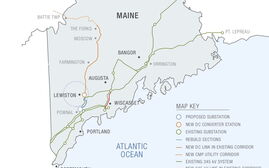Planned CMP electricity corridor receives final major permit, but construction is on hold
Central Maine Power Co.’s proposal for a 145-mile electricity transmission line through the western part of the state has cleared its final regulatory hurdle, but now faces a potential legal one.
The company and its parent, Connecticut-based Avangrid Inc. (NYSE: AGR), last week received a Presidential Permit from the U.S. Department of Energy for the $950 million New England Clean Energy Connect project. The permit is required for any transmission line that crosses a U.S. border into another country.
The NECEC corridor will import renewably produced hydropower from Hydro-Quebec in Canada and deliver it to the New England power grid via a junction in Lewiston. Over the past three years, the project has received other needed permits including ones from the U.S. Army Corps of Engineers and the state's Public Utilities Commission, Land Use Planning Commission and Department of Environmental Protection.
In a news release Friday, Avangrid President Robert Kump said, “After 33 months, hundreds of hours of public hearings, thousands of pages of evidence, and a comprehensive review by state, federal and regional regulators and agencies, there should be no doubt of the value the Clean Energy Corridor brings to Maine to further clean energy goals, provide cleaner air, and lower energy costs.”
CMP and other backers of the project have said it will reduce the use of fossil fuels in Maine by introducing the “clean” power from Quebec, as well as by increasing access to the grid for other renewable power producers. The project will also create more than 1,600 jobs during the two-and-a-half-year construction period and provide $200 million in upgrades to Maine’s energy grid, making Maine’s electricity service more reliable, according to CMP.
In Friday’s news release, the company said it was ready to begin construction, and would proceed with clearing the route and installing temporary access roads for the corridor.
But within hours, No CMP Corridor, a group opposing the project, issued a statement in response to the news.
Tom Saviello, lead petitioner in a citizens referendum effort the group has launched to block the transmission line, said opportunity for public comment on it was inadequate.
Instead of an expected 30-day comment period, he said in the statement, “DOE decided to waive the public comment period altogether, as well as the comprehensive Environmental Impact Study (EIS) that was conducted for similar projects in neighboring New Hampshire and Vermont. This is unheard of and totally unacceptable, and it further highlights the importance of the citizens' initiative that I filed last fall."
Also on Friday, opponents of the corridor scored a victory when a federal judge issued an injunction that puts the NECEC’s construction on hold for 30 days.
The 1st U.S. Circuit Court of Appeals will review a request by the Sierra Club, Natural Resources Council of Maine and Appalachian Mountain Club to overturn a previously issued permit from the Corps of Engineers. The groups appealed the decision of the U.S. District Court for Maine denying the request, and the Circuit Court injunction bars construction for a month while the appeal is pending.
The groups claim the Corps of Engineers did not fully assess the environmental impacts of the corridor, as it did for similar projects in Vermont and New Hampshire. The lawsuit, filed in November 2020, challenges the Corps’ Environmental Assessment and “Finding of No Significant Impact.”
Much of the controversy over the project focuses on a 53-mile stretch of the corridor that would be built on working forest land between the Quebec border and the Forks in Maine. The remaining two-thirds of the project follows existing power lines created for the state’s hydroelectric industry almost a century ago.
Mainebiz web partners
Maine needs cheap reliable energy to grow. Now is the time to negotiate with Massachusetts and other New England states for an extension of a natural gas pipeline to Maine. A natural gas pipeline in exchange for a promise of electrical power from Quebec Hydro through Maine could be enough incentive to bring our southern neighboring states to the negotiation table. Both sources of energy could be a win-win situation for everyone involved. I just hope the governor hears this proposal. We simply can't afford to rely on wind and solar power to supply our future needs.














1 Comments